LGBT citizens of Illinois and their loved ones have been anticipating June 1st for months, ever since Governor Quinn signed Bill SB1716 ― the “Illinois Religious Freedom Protection and Civil Union Act” ― into law on January 31st. This past Wednesday was the first day that couples could register for civil union licenses.
At 7:00 a.m., a crowd (organized by the UP Center) of over 50 people began gathering at the Champaign County Clerk’s office. The ages ranged from young adults in their 20s to couples in their 50s. There was a feeling of elation and giddy anticipation, and it was as if we were all friends and family, all there for one celebration. In a way, we were.

I had intended to arrive, get lots of pictures, and perhaps interview some of the couples planning to register that day. But once I got there, I was unexpectedly loath to walk up to people and shove a recorder in their faces. This was their day, not mine, and not the public’s. Suddenly, approaching complete strangers and asking them personal questions (“How long have you been together?” “How does it feel now that this day has finally arrived?”) felt intrusive, pushy, wrong. Most couples who register to get married do it alone, together. And they laugh, and giggle, and kiss, and talk about the wedding and their future. Maybe they have family there, or a close friend. What they don’t have is the press snooping around bothering them. And staring at them.
So I left those whom I personally did not know alone.
But I did take pictures. Plenty of pictures. And there was laughter, and giggling, and kissing, and talk about weddings and the future. There was quite a bit of that.
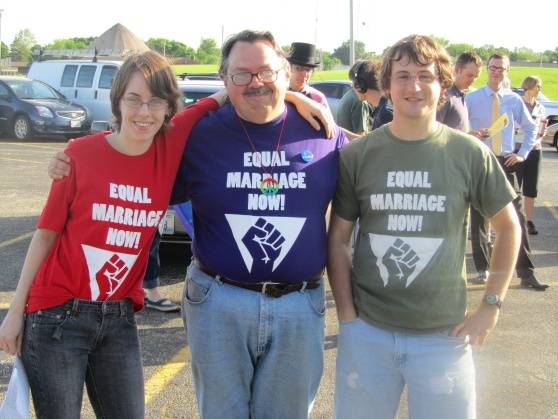 eQuality Champaign-Urbana was there to show support
eQuality Champaign-Urbana was there to show support

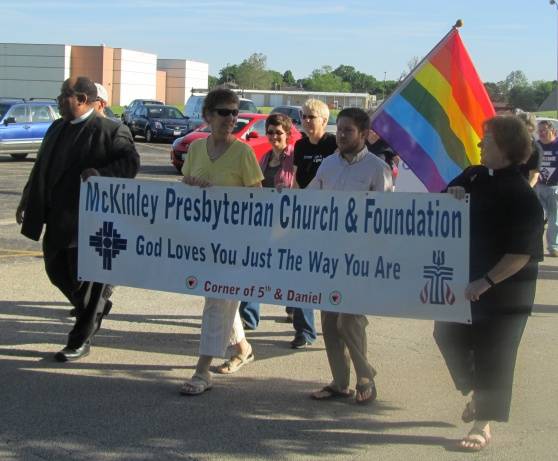 So were Community United Church of Christ and McKinley Presbyterian Church & Foundation
So were Community United Church of Christ and McKinley Presbyterian Church & Foundation
The weather was perfect; the mood was joyous; the cake (provided by Nally, Bauer, Feinen, & Mann) was beautiful; and the doors opened on time.

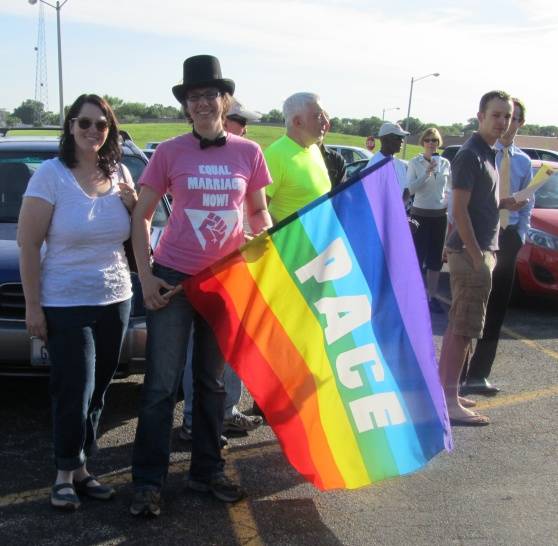
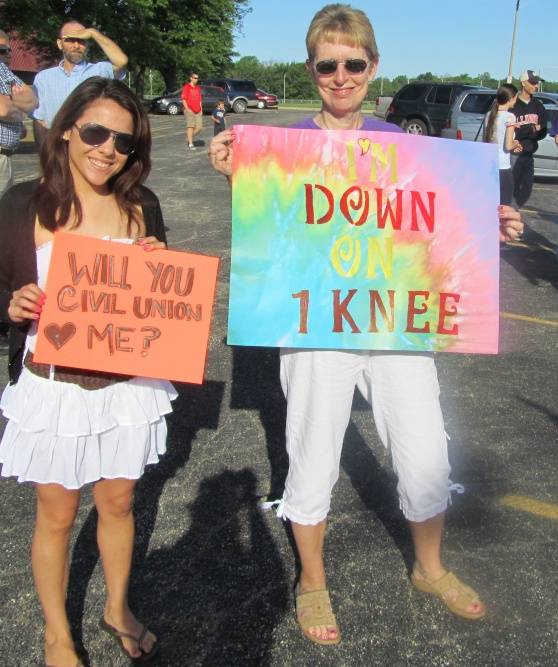
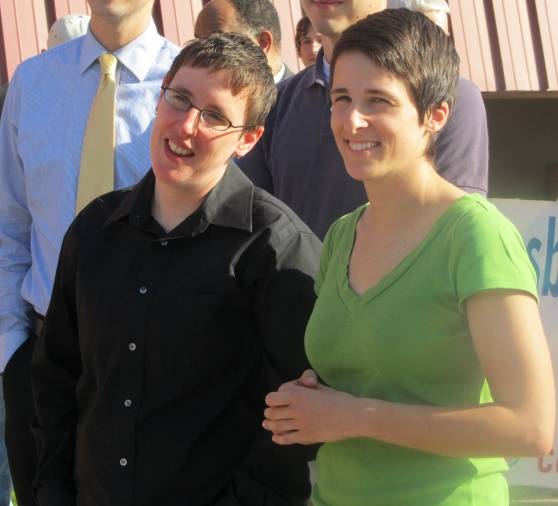
Sarah Riddle and Katy Weseman
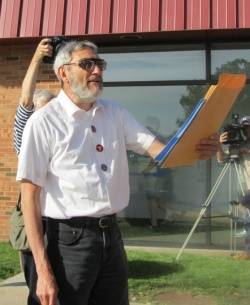
But before everyone entered the building, a Proclamation declaring June “Civil Unions Month” in the cities of Urbana and Champaign, Illinois was read.
As the proclamation was read, I looked around at the smiling, laughing crowd, and I considered what they must be feeling. I can only imagine that they had to have felt just a little more respected, more safe, more welcome to be a citizen of this state. But I could be way off. Sympathetic imagination only goes so far.
And then, finally, the march toward legal recognition began.

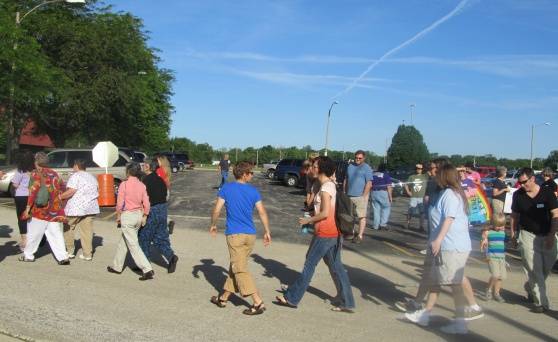
~~*~~
Yes, this week, Illinois made history. Gay, lesbian, and bisexual couples are closer to full equality than we’ve ever been before. At one point, The UP Center’s Kevin Johnson said, “We definitely couldn’t be here without the entire community’s support.” While fully acknowledging that Kevin probably didn’t mean that literally, still, I would tweak that statement a bit. I’d have said that we couldn’t be here without a majority of the community’s support. For we do not have the entire community’s support. If we did, everyone on Wednesday morning would have been there to register for marriage, not civil unions.
As happy and as lovely as Wednesday was, it wasn’t the entire story. And ― to be clear ― no one heard a peep of negativity from me that morning (or, as far as I could tell, from anyone else). But it simply wouldn’t sit well with me to write this article and not acknowledge that the basic rights ― important, crucial rights, to be sure ― for which those couples were registering fall far short of the rights that those in opposite-sex marriages have the privilege of enjoying. (I should acknowledge here that I’m one of those privileged people. I’m bisexual, and married to a man.)
Wednesday was for celebrating; Thursday was for basking in the glow; but ― as the profound philosopher sang ― today is Friday (Friday!). It’s time to get back to work.
I spoke with my good friend Mickie Bailot on Tuesday, the day before she and her partner would be registering to get civilly unioned.
Smile Politely: How long have you and your partner been together?
Mickie Bailot: Twenty-one years as of January 8th.
SP: Would you be married if you had that option?
Bailot [smiling]: Of course.
SP: And why do you want to get civilly unioned?
Bailot: Primarily for the legal aspects of it. People say to us, “Oh! You’re getting married! How wonderful for you!” Our response is that we’ve ― in our minds ― been married for 21 years; this is simply signing off on the legal side of it.
SP: And tomorrow is going to be a wonderful day. We’re anticipating a large crowd, a cake, the press…
Bailot: A coworker asked me, ‘What will you do if the media puts a microphone in your face and asks you what it’s like to have a civil union?’ If that happens I’ll tell them to get the fuck out of my face. Where were they 21 years ago? We’ve had a loving, committed relationship without the benefits that you get as a married couple and we’ve managed to stick it out, when ― what? ― 50% of everyone else doesn’t? So I’m nervous about it tomorrow. I don’t want the local media talking to me. It’s not anything I’m interested in doing. I’m willing to talk to Smile Politely because you’ve been sympathetic to us; you’re supportive of us; you’re making announcements for us. The rest of the media is just looking for a story. They don’t have any interest in us. It’s just the story of the day, and I don’t want to talk to them.
SP: And so, what are the shortcomings of civil unions, as you see it?
Bailot: Well, for one, the fact that there are no federal benefits attached to it. Dan Savage refers to his partner as his ‘Husband-in-Canada/Boyfriend-in-America.’ His HICBIA. That’s how it is. In Illinois, she will be my lawfully wedded partner, with all the rights and benefits, but the second we go somewhere like Indiana, it won’t be recognized.
SP: And even if we had marriage equality in Illinois, you’d be divorced once you left the state.
Bailot: Yes, we’d be roommates again. That’s what really needs to change. That’s the ridiculousness of it.
SP: And also when you’re filing your federal taxes, you’re just living together in the eyes of the federal government. And if you’re ever accused of a crime, she could be forced to testify against you. It goes on and on. All of those rights that we all take for granted…
Bailot: But the young people ― this is changing the dynamic exponentially for these kids. Because now … look, for years it was, ‘Hey, let’s move in together.’ All that was required to walk away, was to walk away. If you had property issues, you hired a lawyer and hoped for the best. But typically, one or the other just left. You just packed your stuff up and checked whose name was on what CD and you went your own way. Now these kids are going to have to decide whether they want to make a legal, binding commitment. And it’s a very different step than moving in with your girlfriend.
SP: But that’s a good thing, isn’t it? Hell, it’s what straight couples have been doing forever.
Bailot: Yes, but for many of us, it’s more complex. People say, ‘Oh, you guys are getting hitched.’ And I answer, ‘Yeah, but we can’t say we’re married.’ We’re just ‘sort of getting legal.’
SP: Are there complications that come specifically with civil unions, that you wouldn’t have with a simple marriage?
Bailot: Again, it’s when we leave the state. That’s going to be an issue. You and your husband can go anywhere, and if he is seriously harmed in an accident, you can go to an emergency room and say, ‘I’m the wife.’ Nobody asks to see a single document. In the state of Illinois we’ve been told that we still need to bring documents with us for a while because nobody’s going to be used to it. But when we leave the state of Illinois, again, we’re not married, so we still have to bring medical and legal powers of attorney, living wills, all the same documentation we’ve been carrying around for 21 years.
SP: What about state retirement here at the U of I?
Bailot: Well, the interesting thing about retirement in the state of Illinois is that when we were newly hired and choosing our retirement packages, we were told that everyone gets to pick one time only. No one ever gets to choose a second time how we want our SURS to pay out. Marriage wasn’t an option for any of us at all, so we all chose portable. There was no reason to pay into something that we’d never benefit from. And that’s a problem. The state really needs to allow those of us who are not considered ‘legal’ a chance to choose again. Because right now, neither one of us can leave our pensions to each other.
Now the young folks, they’ll be able to do that. But you know, it’s one of those things, Tracy, where it gets really old being a trailblazer. The whole: ‘Yeah, I got kicked out of my apartment in 1981. I got fired from my job in 1994 because they didn’t want any queers around.’ Those things … it’s nice that it’s not legal anymore; they can’t kick you out of your apartment in a lot of places; they can’t fire you in a lot of places, but being a trailblazer does get old [Laughs].
SP: And now we have this. We’re about to step on that slippery slope toward marriage equality. Baby steps.
Bailot: When I came out in 1978, I knew gay couples who got married ― two gay guys; two lesbian women ― and they would marry the opposite sex partner just to have some safeguards. It’s one of those things where people argue, ‘Well, it’s a religious institution,’ and I say that’s fine; go have a religious marriage, but if you’re going to tie a thousand benefits to it, then you don’t get…
SP [interrupting]: It’s bullshit. Marriage hasn’t been a religious institution, ever. Personally, for some people? Sure, they can interpret it that way for themselves. But just factually, hell no. Once you start tying federal government benefits to something, it ceases to be a religious institution.
Bailot: Everyone says, ‘Marriage is sacred.’ No, marriage is about property. Marriage is about protecting property and your spouse’s future.
SP: And tomorrow, you’ll finally be able to do that for your wife, at least in Illinois. I know it’s not perfect, and we still have a ways to go, but it’s gotta feel good.
Bailot: It does feel good, but I’m actually nervous too. A coworker asked me today if I had cold feet, and I thought he was asking me if my feet were physically cold, because I don’t have a lexicon for marriage. It doesn’t apply to me, ever, and it never has, so I’ve never developed that lexicon. So when he asked me if I had cold feet, I looked at my sandals and thought, ‘My feet are quite warm.’ [Laughs] He had to explain what he was talking about.
We’re finding it quite funny that we have to have a 24-hour waiting period after being together for 21 years, because we’re joking that we’re going to go home and think, ‘Suddenly, I’m not sure! I might change my mind!’
So it’s all quite odd. Quite odd. We’re happy about it; we’re happy that we’re finally going to get to take that step, but I also don’t trust that they’re not going to try to overturn it. Look what happened in California. I have friends who were legally married in California, and then ‘Oh no you’re not!’ ‘Oh, maybe you are!’ ‘Nope, no you’re not!’ So I don’t trust it. I’m glad that somebody in the state legislature stood up and tried to make it happen. I think they were smart to make it for straight couples as well. But I don’t trust it. I don’t want to be negative about it, but it’s going to be another one of the steps we’ve taken in our 21 years to try and protect one another. We get to change the deed on the house. It’s going to make things a little simpler within the state. For us, this is simply legal recognition. Tomorrow will be a beautiful day, but it won’t be a beautiful, wonderful celebration of our lives together because we’ve been doing that for 21 years.
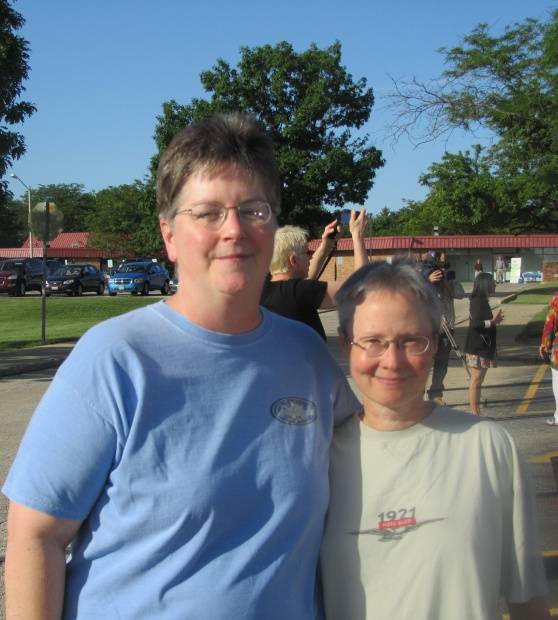
Best wishes, congratulations, and much love to Mickie Bailot and Mary Burkee








